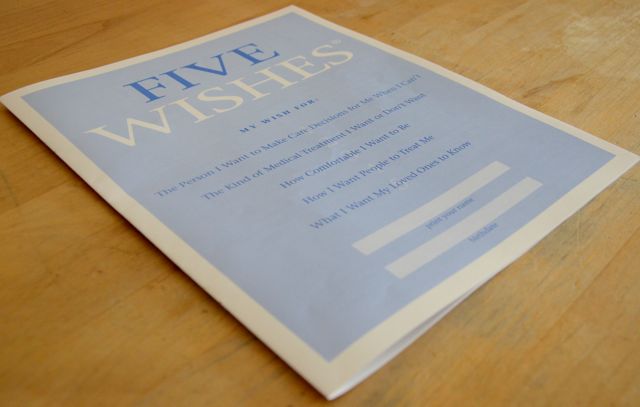Ron Scheinman says his philosophy of life helped him make difficult decisions about end-of-life care. “You never know what could happen,” the 69-year-old observes. “You have to give these things a lot of thought.”
So when Scheinman and his wife, Karen Sparer, moved to North Carolina less than two years ago, they took CarePartners’ Making Choices class together (see box, “Planning Ahead”). The local nonprofit offers the free, one-hour class to help community members learn about medical choices, crucial conversations and advance directives that let people spell out their preferences. A health care power of attorney, for example, designates someone to make medical decisions if the person can’t do this themself. And a living will expresses the person’s wishes concerning life-prolonging treatments.
But as deeply personal as these documents are, they shouldn’t be considered alone, stresses Community Outreach Coordinator Laura Chase, who teaches Making Choices.
“Advance directives,” she explains, “are more of a conversation. We encourage it to not be a ‘sit down and fill out my forms’ kind of thing. We want it to be something where people will think, ‘I’m going to take a look at it, go over this, consider these issues, talk with family and do some soul-searching.’”
One conversation Scheinman had during the class revealed an unsettling fact: When he and his wife moved from New Jersey to North Carolina, differences in state law invalidated his living will. And that, notes Chase, is something you don’t want to be without.
She cites the case of Terri Schiavo, left in a vegetative state following a heart attack in 1990. Eight years later, her husband wanted to terminate her life support. But because she had no living will or other advance directives and her parents wanted to keep her alive at any cost, the fight dragged on for seven years in Florida courtrooms, drawing national media attention.
Scheinman says he felt an urgent need to get a new one drafted, signed and notarized. “I got it executed in one day,” he recalls. “Who wants to think you’ve got yourself covered and then, at the most inappropriate time, you find out the hospital won’t respect what you’ve put down?”
The class also covers a document called Five Wishes. In plain language, it addresses topics ranging from how the individual defines life support to whether they want someone holding their hand even if they don’t seem to respond to others’ voices or touch. Five Wishes is recognized in all but eight states: Alabama, Indiana, Kansas, New Hampshire, Ohio, Oregon, Texas and Utah. Scheinman recently completed his after having it on his to-do list for about a year.
“It’s the kind of thing which is working in the back of your mind, even if you’re not necessarily focused on it,” he says. “When I finally got around to it, it was not at all difficult, but I would certainly recommend that you don’t just casually check certain boxes and consider the documents complete. You have to weigh your options.”
For him, that meant adding legal language spelling out when he would and wouldn’t want life support. “I don’t have a condition where I’m going to die in a matter of days,” he explains. “But if I was leaving my doctor’s office and got hit by a car but could still lead a useful life, then I would want it. I wanted to distinguish between an end-of-life situation and something more acute.” And since his family lives far away, he included a provision allowing them some time to come see him if death were imminent.
With advance directives, says Chase, the devil really is in the details.
“For some people, it’s crystal clear; for others it’s more difficult,” she notes. “Since I’ve been teaching this class, each person I meet has had a different take on what they want. It’s really not cut-and-dried.”
For Scheinman, that ability to personalize Five Wishes was the document’s greatest appeal. “It goes a lot further than the usual boilerplate forms you’d get if you go to a state-government website. This document asks you to think about a lot of things that you might not ordinarily think about but that are very useful and important.”
Anyone who’s 18 or older can fill out the form, notes Chase. And though it’s mostly retirees who take the Making Choices class, she emphasizes that it never hurts to start thinking about your preferences in case of an accident.
“I think the younger you are, the less you know about advance-directive documents, unless you’ve had an experience with a loved one or witnessed a negative experience that will spur people to investigate,” she points out. “Sometimes, the most important thing is thinking ahead and making these kinds of decisions.”




Thanks for posting this article. Advanced Directives is something I emphasize to everyone in my daily medical practice. The Five Wishes is a great document to start the conversation and give some guidance. Oftentimes, living wills are vague. The public should also know that the hospitals tend to use the living wills as guidelines and family members have the right to override a living will. The key is making sure you have discussed this with your loved ones and assign a healthcare power of attorney (HCPOA) you know will be willing to carry out your wishes. Consider more distant family or a friend for your HCPOA. Again, someone you trust. Talk to this person about your wishes in detail.